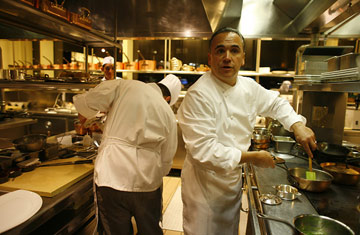
MASTER AT WORK: Not just a master in the Jean Georges kitchen, Vongerichten now runs 18 eateries
(3 of 3)
2:35 p.m. New York City. To get to the real nerve center of the Vongerichten empire, you have to squeeze past the director of creative development fiddling over a mango gazpacho to be featured on Martha Stewart's TV show, past the vegetable guy sniffing a box of honshimeji mushrooms that just came in, past Vongerichten's 25-year-old son, Cedric, who is working the meat station at Jean-Georges. Hidden in the basement sits a small windowless room in which a pair of employees field 2,000 calls a day from customers wanting to book a table at Vongerichten's eponymous eatery. Many others will find their cravings for young garlic soup with frogs' legs or sea scallops with caramelized cauliflower and caper-raisin emulsion stymied by a constant busy signal. "Unless you know how to market your restaurant and make people want to come, all the hard work in the kitchen is nothing," says Vongerichten. "The food is important, but the restaurant business is also about making sure the bathrooms have enough toilet paper."
Vongerichten may still spend several hours a day in the kitchen, but he also needs to constantly pump up the Jean-Georges brand through word of mouth. Today, as he plates a piece of black cod bathed in tomato consommé, he expounds on his cooking philosophy — "the last bite should be as exciting as the first one" — for a woman recording snippets for the upcoming Martha Stewart show. A few minutes later, he takes a call from a local food reporter. Over the weekend, he will roast a baby pig raised solely on apples for Food & Wine magazine, which is organizing a photo shoot. That's his downtime.
Chefs work notoriously long hours, but Vongerichten stretches each day to its extreme. Before presiding over the lunch service at Jean-Georges, he has already held a weekly strategy session with his senior staff and swung by two of his other eateries, Mercer Kitchen, where he signs off on a new blt pizza, and Perry Street, where Hermès is launching a new fragrance. Vongerichten's own apartment is above Perry Street, where he runs into his wife, Marja Allen, an actress and former hostess at one of his restaurants who is half-Korean, a quarter-Native American and a quarter-African American. Their six-year-old daughter already speaks English, French, Korean and enough Spanish to perform The Cat in the Hat as El Gato en el Sombrero at a school play.
Today, Allen is suffering from a bad cold and wants to make chicken soup. She consults Vongerichten for advice. "What should I put in it," she asks. "Salt and pepper, right? Any herbs or other stuff?" Vongerichten responds quickly: "Rosemary and thyme, of course. I'll get what you need." He dashes off to the Perry Street larder and returns with a fistful of European herbs. In the other hand are a bird's-eye chili, a kaffir lime leaf, a chunk of galangal and a stalk of lemongrass. "I couldn't resist," he says, handing her the fusion herb collection. I wonder aloud whether all these strong, disparate flavors will meld into something coherent — and, more importantly, something that will soothe a cold. Vongerichten looks at me, then at Allen. "Both of you, you are a mix of cultures, of races. The world is like that now. I'm cooking for this new world."